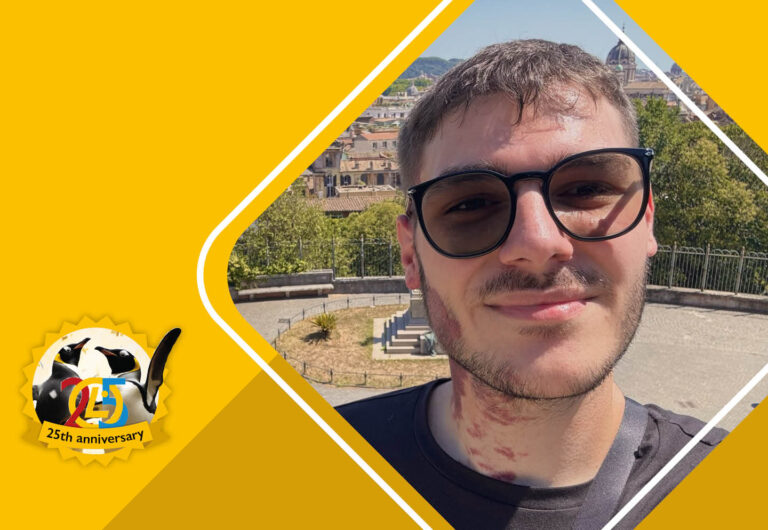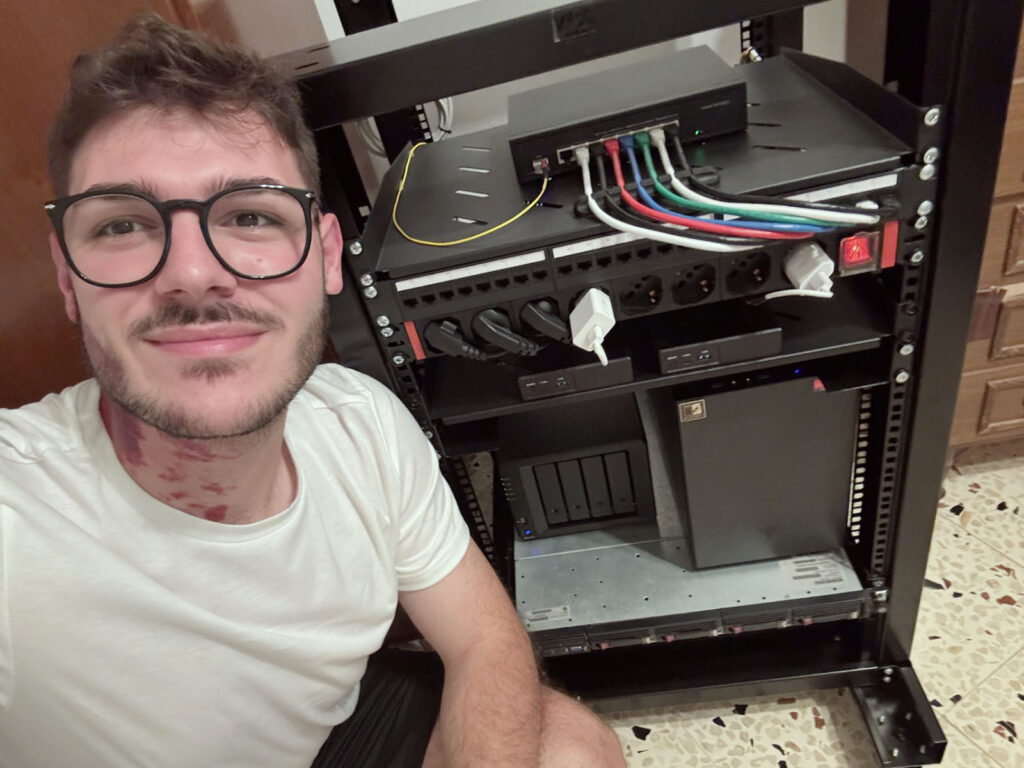From Linux Enthusiast to Unix Engineer: Daniele Briguglio

As part of our LPI25 anniversary series, we are proud to share the journey of Daniele Briguglio, whose passion for Linux began at the age of 14. Like many who have grown up with the open source movement, Daniele’s story highlights how curiosity and dedication, supported by LPI certifications, can shape a career in technology.
Through his own initiative and learning—much of it self-taught—Daniele has gone from experimenting with Debian on his home lab to becoming a Unix System Engineer and Security Enabler. His journey showcases how open-source technologies and LPI have been pivotal in shaping his career.
Explore more stories like Daniele’s at LPI Success Stories as we celebrate 25 years of empowering individuals through open source and Linux education.
Read Daniele’s Story:
My name is Daniele Briguglio. I’m 24 years old, and my adventure in the world of IT began in 2014 when I was just 14. I still remember the excitement of discovering Linux for the first time, using a small server I had purchased from a hosting company. I started exploring the system and discovering what made it so special. Among all the distributions, Debian was the one I loved the most. Its lightness, simplicity, and intuitiveness made it ideal compared to other operating systems, which often seemed more oriented toward desktop users.
Charting a New Path to Pursue My Passion
I studied Electronic Engineering, but it didn’t ignite my passion. Instead, my love for IT guided me towards a different path. To showcase my abilities and pursue my true interests, I earned certifications in Networking 101, Python, and PHP, among others. This journey enabled me to turn my passion into a career and acquire the skills necessary to excel in the IT field.
Collaborations with the Big Players in the Industry
After gaining extensive experience in the cloud and virtualization, I began working as a Unix System Engineer for a company. In this role, I’ve had the opportunity to collaborate with major players in the hosting provider and cloud services markets.
Recently, I’ve taken on roles as a Security Enabler and Academier. As an Academier, I focus on continuous training to help colleagues stay ahead with new technologies. As a Security Enabler, I implement practices to protect our infrastructure and data from emerging threats.
My Personal Learning Laboratory
Outside of work, I fuel my passion for IT through a homelab I built. It lets me experiment with new technologies, test configurations, and tackle real-world challenges, helping me grow professionally. Though it requires dedication, it offers continuous learning that I apply in my daily work.

Daniele with the equipment in his homelab.
Open Source Projects and Linux Kernel Integration
Recently, I’ve embarked on new challenges in the open source world, especially implementing SBC (Single Board Computer) boards in the current Linux Kernel. A particularly significant project involves a board for which no documentation or support was provided by the suppliers. Despite my initial lack of experience with the Kernel and DTS (Device Tree Source), I decided to tackle this challenge with determination.
The process of integrating the board into the current kernel wasn’t easy, as the original OS used an older version. However, I successfully completed the integration with the help of online documentation and support from the open-source community. The board is now available in a public Armbian repository.
Continuous Learning and Certifications
My current role in the company is not just about helping my colleagues develop their skills; it’s also about my ongoing desire to learn and certify myself in new technologies. A key goal for me is to continue expanding my skills and obtaining new certifications to stay at the forefront of my field.
One certification that has particularly inspired me is the Linux Professional Institute (LPI) LPIC-1 Certification. This certification journey taught me the importance of being well-prepared and provided deep and meaningful learning. It’s not an easy path, but it’s incredibly rewarding. I highly recommend anyone looking to deepen their Linux knowledge to pursue this certification and take the related courses. It’s an investment that pays off tremendously in terms of knowledge and preparedness.
Passion and Dedication: A Lifelong Journey…
My journey in the world of IT has been driven by passion and curiosity. Every new challenge is an opportunity to grow, and every success is a result of dedication and commitment. I firmly believe that knowledge is a continuous journey and that technology requires constant updating and adaptation. My homelab, certifications like LPIC-1, and my daily work as a Unix System Engineer are all integral parts of this ongoing evolution. My goal is not only to excel in my field but also to inspire and support those around me, contributing to a work environment where personal and professional growth are paramount.
… You can try it yourself!
Embarking on a journey in the world of IT can be both challenging and rewarding. Whether you’re just starting out or looking to deepen your expertise, having a clear plan and the right tools can make all the difference. Here are some practical tips that helped me along the way, and they might just do the same for you:
- Study Planning: Begin with a clear study plan. Break down the material into manageable sections and allocate daily time for both theory and practice.
- Practical Learning: Engage in hands-on practice, especially by utilizing high-quality resources. When I decided to pursue the LPIC-1 certification, I chose to follow Moreno Razzoli‘s course, which was incredibly effective in providing in-depth knowledge and practical exercises. The corporate planner I have been working with scheduled about three hours of study per day, and I applied what I learned directly in my homelab. This combination of guided learning and real-world application significantly reinforced my understanding and skills.
- Embrace Mistakes: View mistakes as valuable learning opportunities rather than setbacks.
- Use Quality Resources: Invest in reliable resources, and supplement them with study guides, practice questions, and online tools to ensure you’re learnig the most relevant content.
- Simulations and Practice Tests: Take multiple practice tests in realistic settings to identify areas for improvement and build confidence.
- Networking and Community: Connect with others on the same path through forums, study groups, and online communities to share experiences and receive support.
My journey with LPI began after several years of experience with Linux, when I decided to pursue the LPIC-1 certification to formalize my skills and advance my professional growth. I meticulously planned my study schedule, dedicated myself to daily study, and applied what I learned in my homelab. By following a structured approach and utilizing the right resources, I built a solid foundation in networking, security, and Linux administration. Successfully passing the exam left me feeling more prepared and confident, opening up new opportunities in my career.
With dedication, the right strategies, and a commitment to continuous learning, you too can navigate your path and achieve your goals. Good luck on your journey!
Daniele and… LPI25
Where were you 25 years ago?
Twenty-five years ago, before I was born, the tech world was changing. Linux, released in 1991, was gaining momentum, and the open-source movement was growing, attracting developers and setting the stage for the technological evolution I would later join.
How old were you when you started working with Linux?
I started using Linux at 14, beginning with Debian for its simplicity and efficiency. Through self-study and online resources, I developed problem-solving skills and a mindset of continuous learning. Exploring other distributions like Ubuntu and Arch helped me grow as a systems engineer.
Looking ahead, where do you think Linux will be in [5 and] 25 more years?
I believe In 25 years, Linux will remain a key player, powering servers, supercomputers, mobile devices, and embedded systems. Its flexibility will make it essential in AI, machine learning, cloud computing, and IoT. As threats evolve, the open-source community will strengthen security, and Linux certifications like LPIC will grow in relevance. Ultimately, Linux will continue to drive technological progress through open-source collaboration.
<< Read the previous post of this series | Read more LPI success stories here >>
